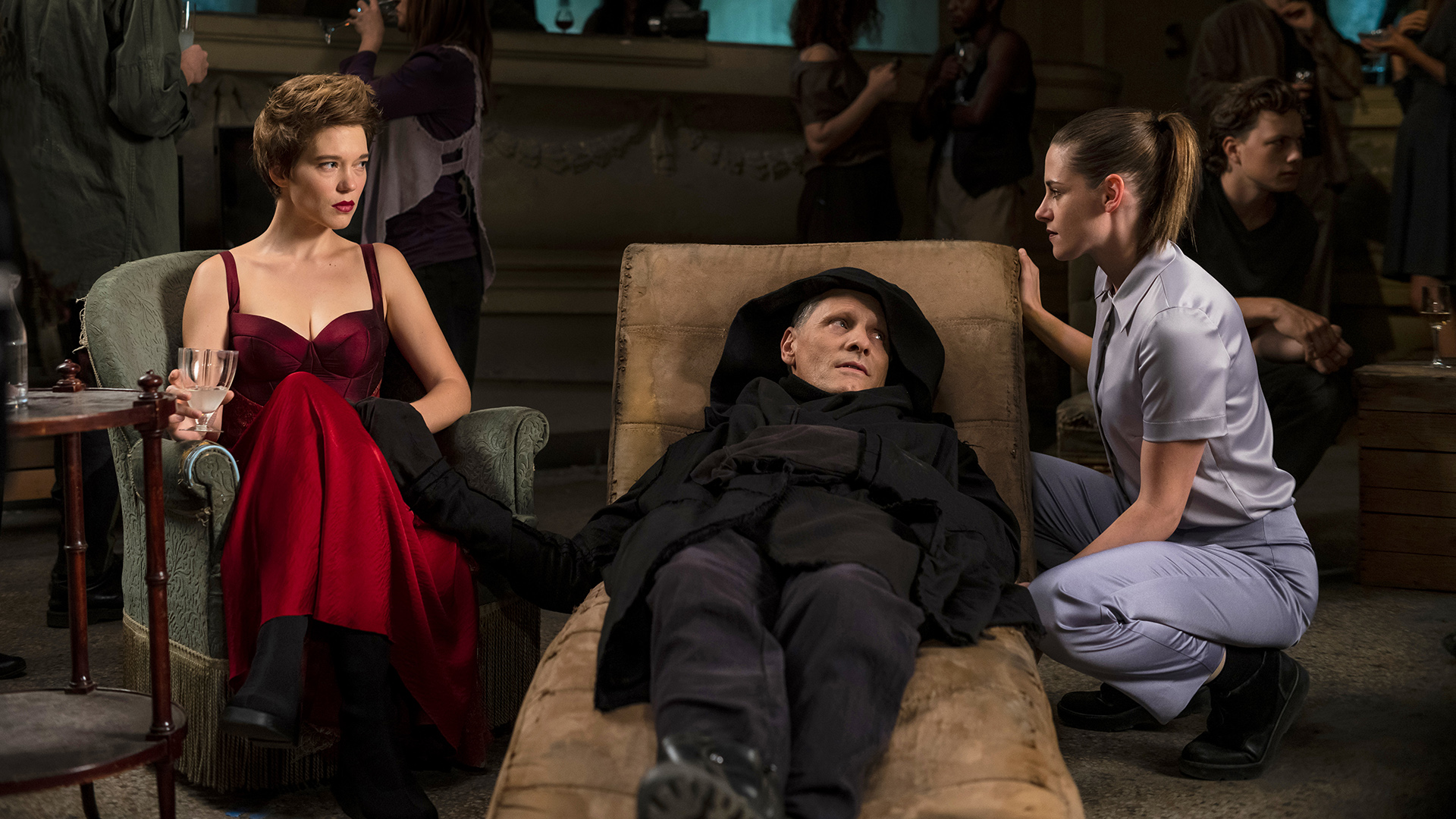GamesRadar+ Verdict
Sex, violence and surgery: the king of body horror is back, but the script could do with a scalpel.
Why you can trust GamesRadar+
In the pantheon of filmmakers whose surnames also double as adjectives David Cronenberg stands apart. After all, plenty of directors have made films that could be described as ‘Hitchcockian’ or ‘Kubrickian’, but venture into ‘Cronenbergian’ territory at your peril. The Canadian controversy-magnet’s first unashamed body horror in 23 years, Crimes Of The Future feels authentically part of the filmmaker’s uniquely weird oeuvre in a way that will delight ravenous fans, even if the low-energy, overly-talky, oddly open-ended script doesn’t hit the heights of his ’80s heyday.
Like much of Cronenberg’s work, Crimes… is a film about the interplay between the body and technology, the new flesh and the old. In Videodrome television was the virus; here’s it’s surgery. In the world of Crimes…, pain is a thing of the past, experienced by the few, and only while they sleep. Human bodies are changing, but evolution is out of control. Saul Tenser (Viggo Mortensen) is one such person whose body has started to produce ‘neo-organs’. Their purpose is unclear, because Tenser has them surgically removed by his partner Caprice (Léa Seydoux) in celebrated performance art shows that have earned him a legion of freaky fans.
Neo-organs are policed both by the National Organ Register, represented by a pair of oddball employees, Wippet (Don McKellar) and Timlin (Kristen Stewart), who seem to revere Tenser far more than they should; and the New Vice Crime unit, who work with Tenser to keep human evolution in check. But there are groups who believe that change should be curtailed no longer, and they see in Tenser and Caprice’s shows a way for the message to spread beyond their underground networks.
Talked up ahead of its Cannes premiere for its potential shock value (Cronenberg has said he expects walkouts in the first five minutes) Crimes… isn’t for the faint of heart – primarily because you see a fair few of them. Central to Tenser’s shows is an autopsy machine that uses skeletal appendages to cut through flesh like butter and extract organs. Drills enter crania, faces are sliced, a man covered in ears has his eyes and mouth stitched shut. Most distressing is the graphic murder and eventual dissection of a young boy.
Almost all of this is achieved through pleasingly squidgy prosthetics and special effects that exist one step outside recognizable reality. The surgery scenes, for example, feature scarcely a drop of blood, while LifeFormWare’s freaky bio-mechanical tech (including a fleshy bed and gyrating breakfast chair) is too goofy to be out-and-out disturbing. Truth be told, it’s easy to imagine a version of Crimes… that pushes the body horror to even further extremes. Brandon Cronenberg’s Possessor, for one, is far more viscerally graphic than anything Cronenberg Sr. has committed to the screen here.
More transgressive, in some ways, are the film’s ideas. “Surgery is the new sex,” Stewart says provocatively. When Tenser and Caprice make love they do so by nakedly embracing on the autopsy table and lying perfectly still as surgical knives simultaneously penetrate their skin – a concept not a million miles away from Crash’s Croisette-terrorising auto-erotica, though far easier to stomach.
The 'art of the inner landscape’ is the new culture in Crimes Of The Future; material concerns appear to be a thing of the past. This is a dirty, forgotten world, as established by Carol Spier’s scuzzy production design. It’s not the most elaborate bit of near-future world-building, but it does feel like a society on its last legs having ravaged the planet, and now on the cusp of moving past the organic world and into the synthetic. This plays into the plot – eventually – with an ecological message that should perhaps have been central from the start.
Crucially, Crimes Of The Future feels authentically Cronenbergian in a way that’s hard to intellectualise, but you’ll know it immediately when you see it (and hear it, in the case of Howard Shore’s operatic score). This isn’t some sad cover act from a master trading on old glories. Crimes… would have slotted imperceptibly inbetween Crash and eXistenZ had it been filmed when the script was initially written some 20 years ago, which in itself feels like a miracle.
The problem is, despite some gleefully twisted ideas, Crimes Of The Future isn’t one of Cronenberg’s strongest screenplays. Overwhelmingly jargon-dense, it’s even talkier than the character dramas he was helming in the 2010s. What may have been subtext in his economical scripts for Scanners or Videodrome is often clumsily vocalised text here. The closest thing you get to a pulse-quickening bit of genre action is someone pushing some fleshy buttons on a control unit to carefully cut open an abdomen. At times you’ll be screaming out for someone’s head to explode.
Mortensen has done some of his best work under Cronenberg’s direction in A History Of Violence and Eastern Promises, but Tenser is one of the pair’s lesser creations. A central conceit of the character is that he’s constantly unwell as his body ‘cooks up’ new organs. This translates to Mortensen speaking in a gruff, hushed Batman voice between annoying hacking coughs. Léa Seydoux feels more naturally at home in this world, and manages to believably connect the dots between sex and surgery in a way that the script only tells us. Stewart, unfortunately, is somewhat underserved by a role that affords her no standout scenes and a character whose nervy fangirl energy is at odds with the languorous world around her.
Strangely, it’s a film that introduces new ideas, new character motivations and new plot threads almost up till the abrupt final moments in a way that makes it feel more like the pilot for a series than a self-contained feature – a fact not helped by the film’s refusal to explore potentially more exciting avenues that are established, then frustratingly swerved. But it could have been a whole lot worse. That Crimes Of The Future can even be described as successfully ‘Cronenbergian’ will be enough for many. Forget the new flesh, long live the old master.
Crimes Of The Future releases in the US on 3 June, and does not currently have a UK release date. Stick with Total Film for all the latest coverage from Cannes 2022 – check out our review of Decision To Leave, through that link.
More info
| Genre | Horror |

I'm the Managing Editor, Entertainment here at GamesRadar+, overseeing the site's film and TV coverage. In a previous life as a print dinosaur, I was the Deputy Editor of Total Film magazine, and the news editor at SFX magazine. Fun fact: two of my favourite films released on the same day - Blade Runner and The Thing.



